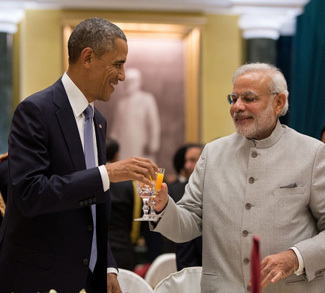Elon Musk’s role in shaping US foreign policy through his leadership of a yet-to-be created “Department of Government Efficiency” in the new Donald Trump administration could signal a dramatic shift in both domestic governance and international relations. Musk, a billionaire entrepreneur known for his work with Tesla, SpaceX and Neuralink, has increasingly positioned himself as a global figure with influence that transcends the business world. This potential move into government could capitalize on Musk’s ability to integrate technological innovation into policy, though its implications for US foreign policy are complex and multifaceted.
The Vision: Efficiency and Innovation at the Heart of Government
Musk’s hypothetical appointment as the head of a Department of Government Efficiency, alongside political entrepreneur Vivek Ramaswamy, could bring a new perspective to US foreign policy. This novel department would ostensibly focus on eliminating bureaucratic inefficiencies within the federal government while promoting the rapid adoption of technological solutions. Musk’s past ventures, such as SpaceX’s Starlink internet service, could serve as a key tool in advancing US diplomatic and strategic goals.
Starlink, Musk’s satellite internet initiative, has already demonstrated its utility in regions with limited infrastructure, from war-torn Ukraine to remote villages. By providing internet connectivity where traditional methods fail, Starlink offers a unique form of technological soft power. Its potential deployment in foreign policy could be revolutionary, positioning the United States as a provider of cutting-edge communication technology while sidestepping traditional geopolitical conflicts associated with infrastructure projects. Musk’s vision for leveraging these technologies could transform US engagement in the Indo-Pacific, a region central to global economic and security dynamics.
A Global Diplomat: Musk’s Increasing Role on the World Stage
Musks’s international presence has been growing steadily, with a particular focus on technological diplomacy. His meeting with Iran’s UN Ambassador, Amir Saeid Iravani, during the 2024 United Nations General Assembly serves as a clear example of how Musk is using his tech empire to engage with global politics. While the specifics of their conversation were not fully disclosed, reports suggest they discussed the role of satellite communications in overcoming connectivity barriers, particularly in regions subjected to sanctions and reducing tensions between the United States and Iran. By potentially using Starlink to facilitate communications in these areas, Musk’s intervention could be seen as an attempt to bypass traditional diplomatic channels, instead leveraging technology to mediate geopolitical tensions.
This meeting underscores Musk’s willingness to engage with adversarial regimes like Iran, contrasting with traditional US diplomatic strategies that focus on economic sanctions and statecraft. While this approach could raise eyebrows in Washington, Musk’s ability to bridge divides through technology may offer a new avenue for diplomacy, particularly in volatile regions such as the Middle East. His efforts to bring technological solutions to complex political problems may align with the broader goals of US foreign policy—strengthening alliances, improving communication and providing development aid.
Strategic Implications for the Indo-Pacific
The Indo-Pacific, with its mix of emerging markets and tense geopolitical rivalries—particularly between the U.S. and China—is a region where Musk’s role in US foreign policy could have profound effects. US strategies in the Indo-Pacific have traditionally cantered on countering China’s expanding influence, especially through initiatives like the Belt and Road Initiative (BRI). Musk’s technological innovations could provide an alternative to China’s growing infrastructure footprint, particularly in the digital sphere.
Musk’s Starlink service could play a critical role in this context. Providing satellite internet to countries in the region could offer a strategic advantage by connecting underserved populations to the global economy. Additionally, Starlink’s ability to bypass local infrastructure could enable the US to exert influence in countries that may be wary of Chinese investments. Given that only 50% of the population in the Indo-Pacific have access to the internet on their mobiles, providing universal connectivity could further the region’s digital integration, aligning with broader US goals of promoting development and countering China’s growing presence.
Furthermore, Musk’s ties with China—through Tesla’s massive investments in Shanghai and his communications with Chinese officials—illustrate his ability to balance economic engagement with geopolitics. While critics argue that Musk’s approach sometimes appears overly accommodating to Beijing, it highlights his capacity to navigate the complex web of US-China tensions. His skill at maintaining relationships across competing powers could be invaluable in the Indo-Pacific, where the United States must manage both strategic competition with China and strong partnerships with allies like Japan, South Korea, and Australia.
Risk and Controversy: Navigating the Global Stage
While Musk’s influence is undeniable, his leadership within the US government also comes with risks. His track record in navigating sensitive issues—such as his response to antisemitism on X (formerly Twitter) during his visit to Israel—has raised concerns about his ability to manage international perceptions. Musk’s handling of social media platforms, particularly regarding content moderation, has sparked debates about his judgment and approach to diplomacy.
Additionally, his techno-centric focus—where technology solutions are prioritized above traditional diplomatic tools—might oversimplify the complexities of international relations. The Indo-Pacific, with its diverse political systems and fraught history, requires diplomatic engagement that goes beyond just technological solutions. Musk’s emphasis on efficiency and innovation may overlook the cultural, historical, and political nuances that are essential in navigating the region’s complex diplomatic landscape.
Data and Statistics: The Tech-Driven Future of US Foreign Policy
Risks aside, Musk’s technological ventures are poised to redefine US foreign policy. According to recent data, the global satellite broadband market, which Starlink has dominated, is expected to reach nearly $23 billion by 2026, driven by demand in underdeveloped regions. This growth presents an opportunity for Musk’s services to expand US influence in areas previously untouched by traditional diplomacy. Moreover, US government contracts with private sector companies like SpaceX have surged in recent years, with SpaceX receiving over $3 billion in government contracts for projects such as the Falcon Heavy rocket and Starship missions. This growing public-private partnership suggests a future where US foreign policy increasingly relies on technology firms to advance national interests on the global stage.
The US military’s interest in space-based technologies further emphasizes the role that private companies like Musk’s could play in national security strategy. The US Department of Defense has long worked with private firms to develop space capabilities, with companies like SpaceX at the forefront. In this context, Musk’s leadership could potentially integrate military and diplomatic objectives, using space-based technology as both a strategic and diplomatic tool.
Looking ahead, Elon Musk’s leadership of a hypothetical Department of Government Efficiency in the Trump 2.0 administration raises concerns about the viability of technocratic diplomacy in addressing complex geopolitical challenges. While Musk’s innovations like Starlink show promise, his approach risks oversimplifying issues that require nuanced, multilateral diplomacy. His tendency to prioritize business interests—such as maintaining ties with China despite geopolitical tensions—could undermine US foreign policy objectives. Furthermore, Musk’s erratic public persona and techno-centric focus may fail to account for the cultural, social and historical intricacies of international relations, particularly in regions like the Indo-Pacific and the Middle East.
The views expressed in this article belong to the author(s) alone and do not necessarily reflect those of Geopoliticalmonitor.com.




